10+ Progress Report for Students Examples to Download
Picture this situation: Your kid excels in almost everything, what are you going to do to make sure that they excel in their academics and their social lives? How as a parent are you able to know what goes on in school if you have no idea? What do you do? It goes without saying that parents and teachers would always want their kids or their students to excel in everything they do. Sometimes too much of the pressure can be frustrating to students. But this should not be the case. For students, teachers and parents know that understanding and knowing the progress of their students or children is important. To be able to know what they are doing in school as well as knowing their weaknesses and strengths. For this to happen, teachers often give out report cards to the parents and to explain the reasons to the parents. If you know where I am going with this, you probably heard of progress reports. Progress reports are not only used for companies or businesses, they can also be used by teachers to track progress of their students. But how does it work? To know more, simply scroll down and enjoy learning more about it.
What is Progress Report for Students?
Progress Report for Students Format
Opening Remarks
Good [morning/afternoon], dear parents, students, and faculty members. It is with great pride and gratitude that we present this progress report for our students.
Introduction
The purpose of this report is to provide a comprehensive review of the academic, behavioral, and extracurricular progress of our students during this term. It highlights their achievements, areas for improvement, and the collective efforts made to support their growth.
Acknowledgments
Student Effort:
We commend the dedication and hard work of all students in their academic and extracurricular pursuits. Their enthusiasm and commitment are truly inspiring.
Teachers and Educators
Recognition:
A special thanks to our teachers and educators who have tirelessly guided and mentored the students, ensuring their learning journey is fruitful and engaging.
Parents and Guardians
Appreciation:
We deeply appreciate the continuous support and involvement of parents and guardians, whose encouragement plays a crucial role in each student’s progress.
School Administration
Gratitude:
We extend our heartfelt thanks to the school administration for providing the resources and support necessary to create a nurturing and effective learning environment.
Support Staff
Acknowledgment:
The contributions of our support staff, from administrative personnel to facilities management, have been integral in ensuring the smooth functioning of all school activities.
Closing Remarks
Summarize:
This progress report is a testament to the combined efforts of students, teachers, parents, and staff. Together, we celebrate the achievements of our students while recognizing areas for future growth.Final Thanks:
We extend our sincere gratitude to everyone involved in making this term a success.Farewell:
Thank you for your attention, and we look forward to continuing our journey together toward greater accomplishments.
Progress Report for Students Example
Short Progress Report for Students
Student Name: [Name]
Grade/Year: [Grade/Year]
Teacher: [Teacher’s Name]
Date: [Date]Academic Performance: [Name] has demonstrated consistent performance in [subject areas]. They excel in [specific subject/skill] but need improvement in [specific area].
Strengths: [Skill/Subject-specific strength], [Skill/Subject-specific strength]
Areas for Improvement: [Skill/Subject-specific area for improvement], [Skill/Subject-specific area for improvement]
Attendance: [Name] has attended [number] out of [total] days. Attendance is satisfactory/needs improvement.
Remarks: Overall, [Name] is progressing well. With consistent effort in [specific area], they can achieve greater success.
Teacher’s Signature: [Signature]
Daily Progress Report for Students
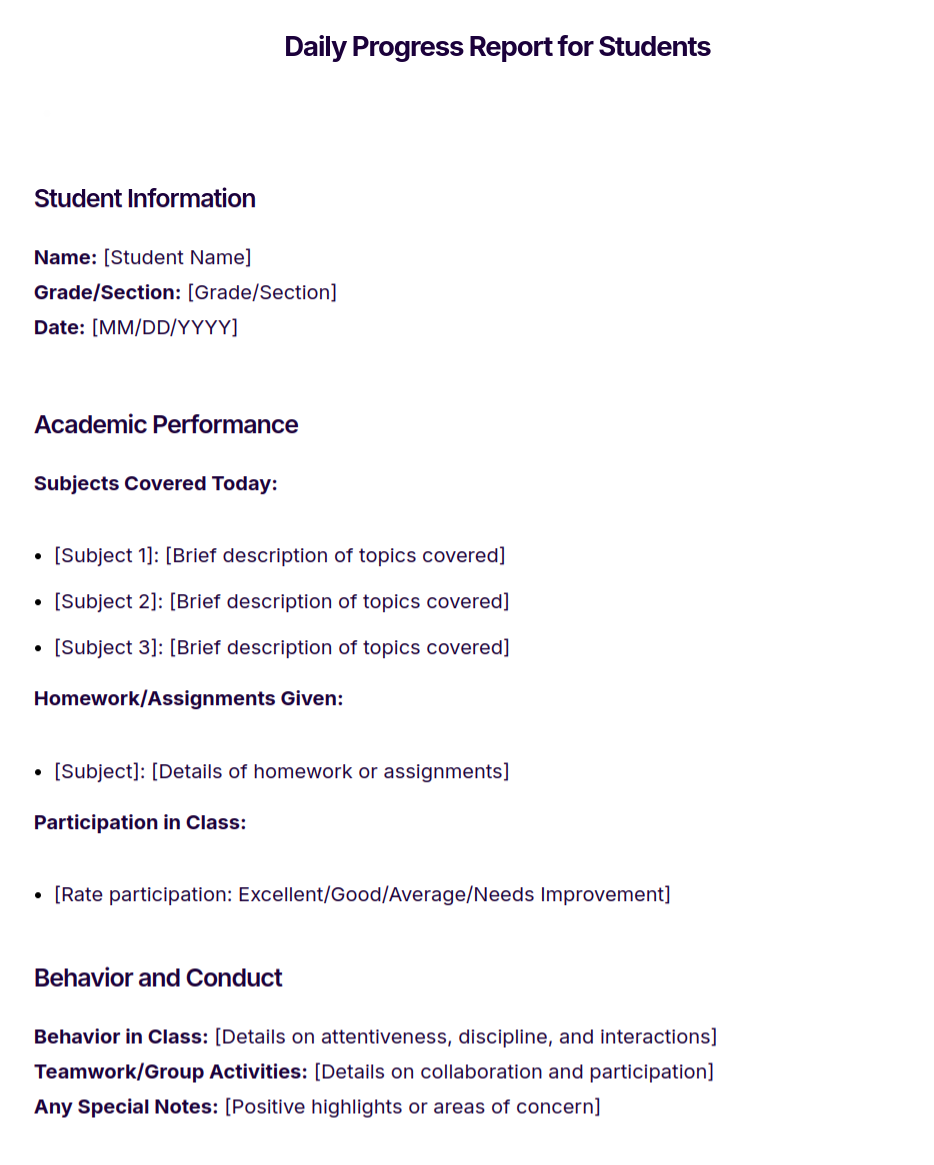
Weekly Progress Report for Students
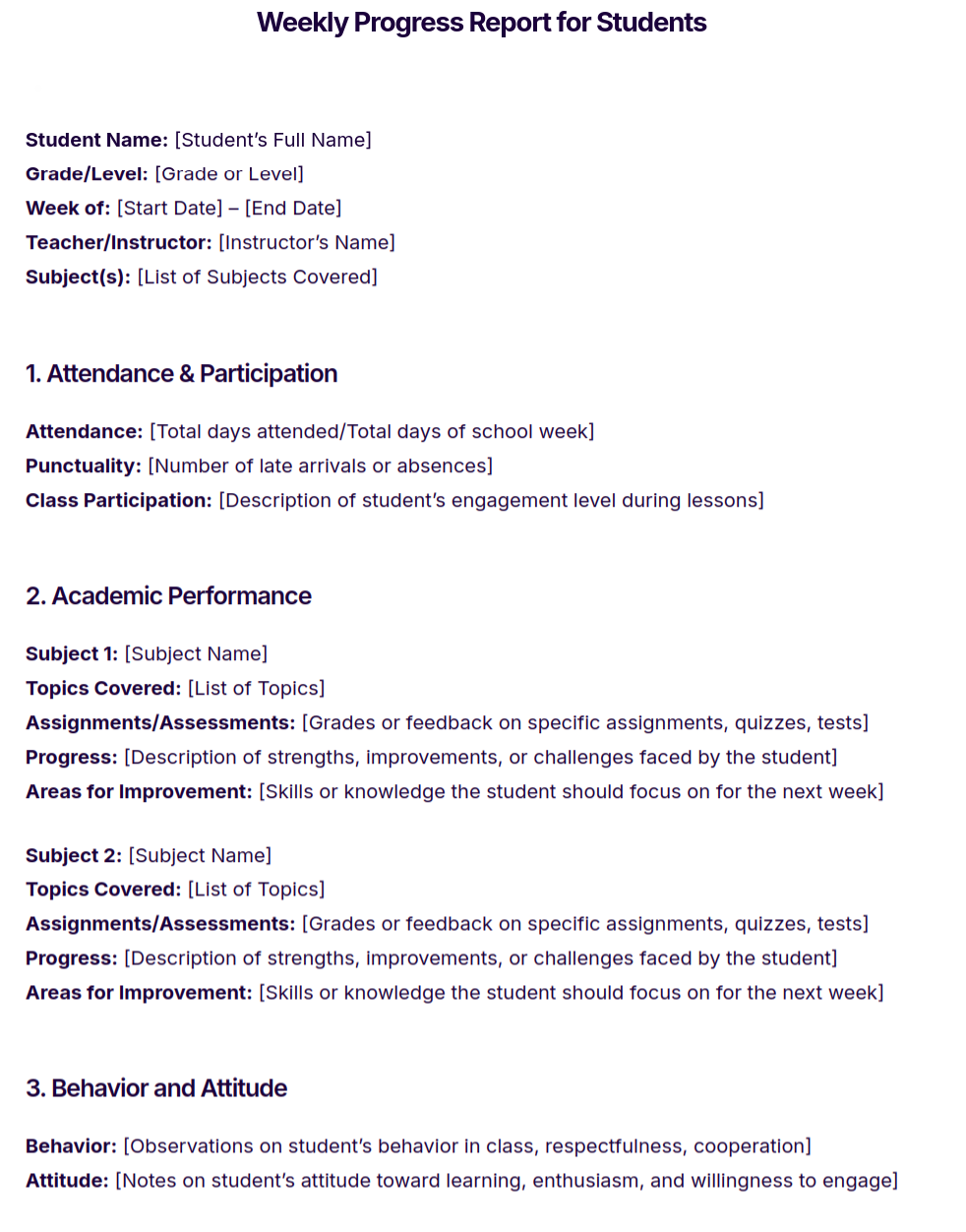
Monthly Progress Report for Students
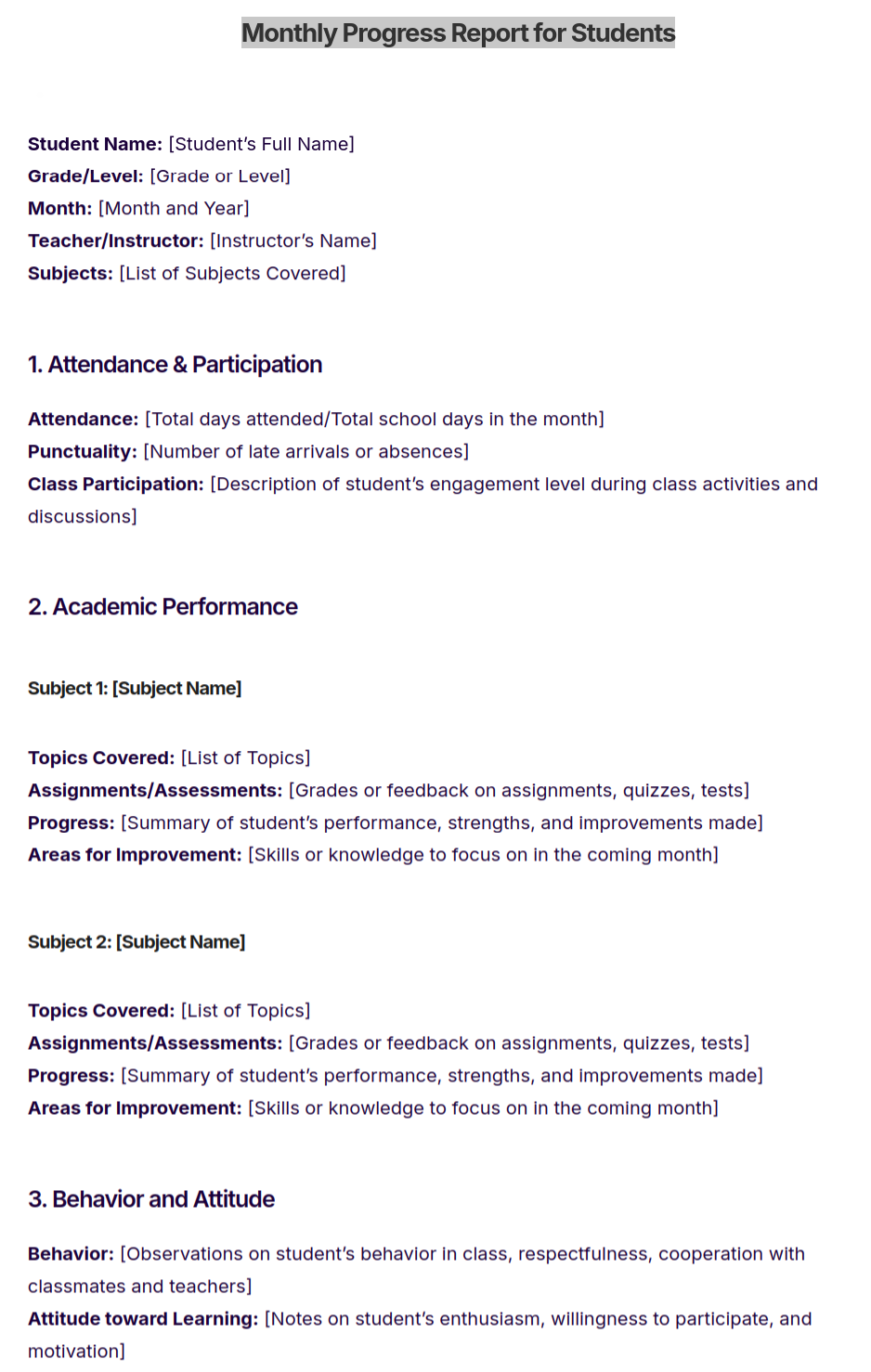
10+ Progress Report for Students Examples
1. Student Progress Report Template
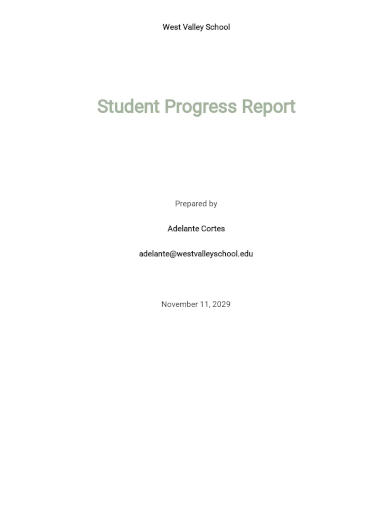
2. Student Progress Report Card Template
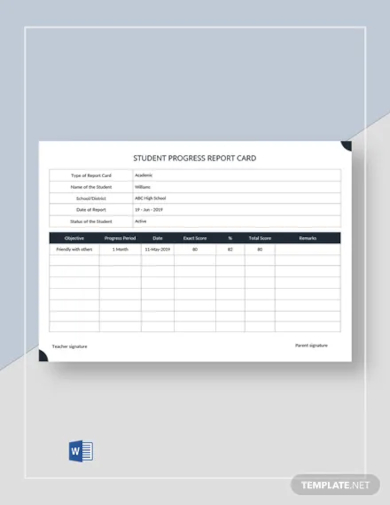
3. Music Student Progress Report
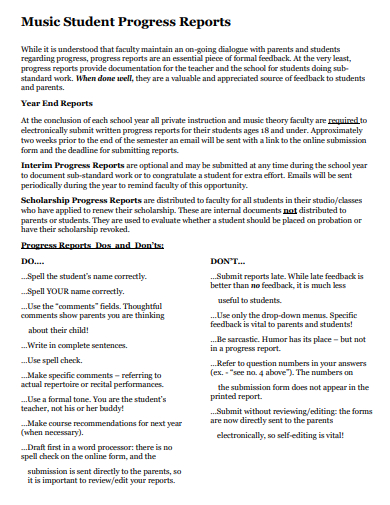
5. Sample Progress Report for Students
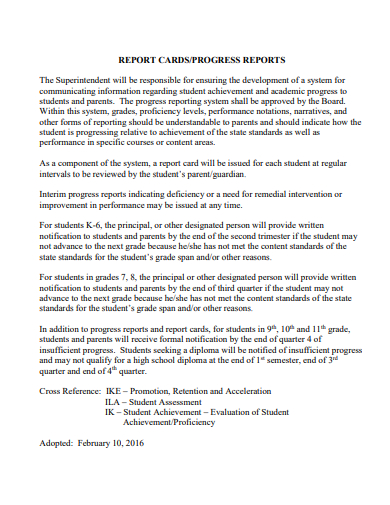
6. Progress Report for Elementary Students
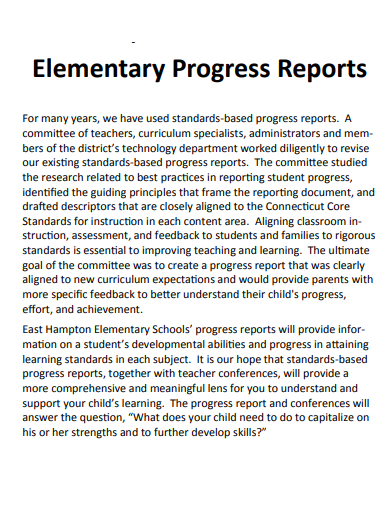
7. Students Teaching Midterm Progress Report
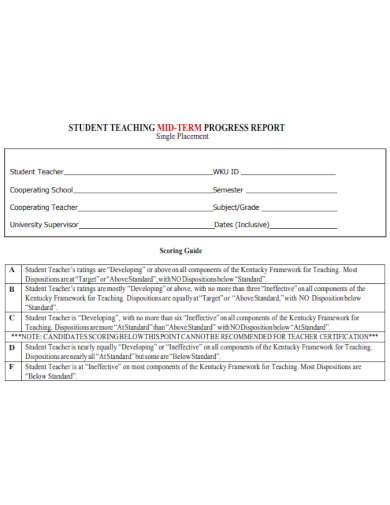
8. Progress Report for College Students
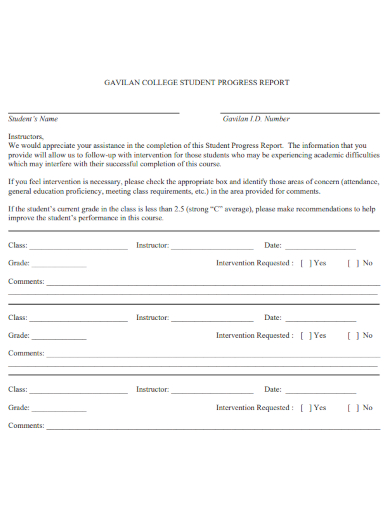
9. Progress Report for Primary Students
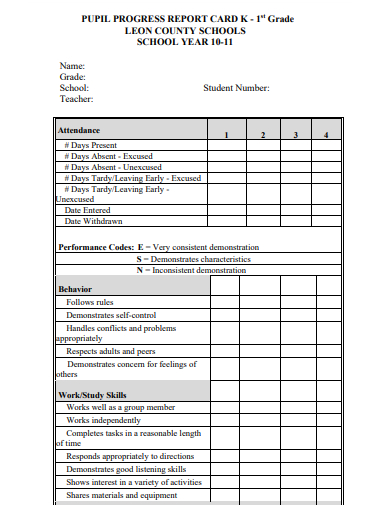
10. Monthly Progress Report for Students
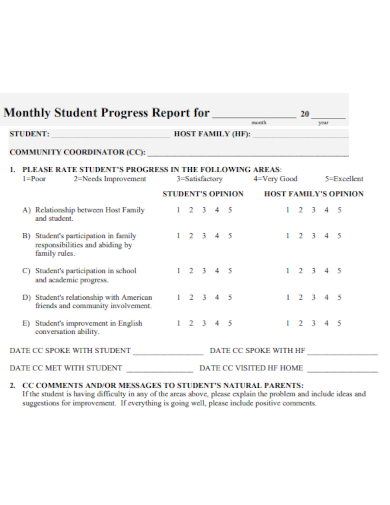
11. Weekly Progress Report for Students
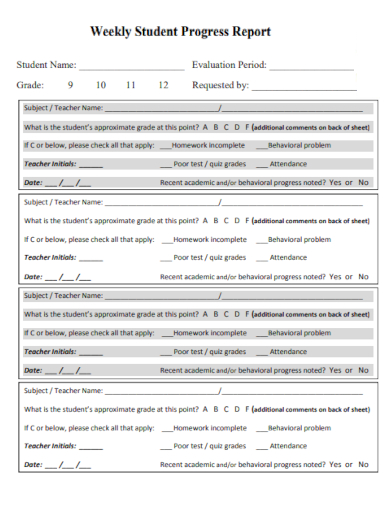
How to Write a Progress Report for Students?
Title and Basic Information
Clearly mention the title, such as “Student Progress Report.”
Include basic information:Student Name
Class/Grade
Report Period
Date of IssueAcademic Performance
Provide details about the student’s performance in different subjects.
Highlight strengths and areas for improvement.
Use clear and concise language, supported by examples or grades.Behavioral and Social Development
Evaluate the student’s behavior in school, interaction with peers, and participation in group activities.
Highlight positive traits such as leadership, teamwork, or creativity.Attendance Record
Include a summary of the student’s attendance and punctuality.
Mention if absences or tardiness have impacted their progress.Extracurricular Activities
Discuss the student’s involvement in sports, arts, or other activities beyond academics.
Emphasize any significant achievements or contributions.Teacher’s Comments
Provide personalized feedback for the student.
Acknowledge their efforts and improvements.
Offer specific advice on how they can continue to grow.Goals and Recommendations
Set realistic and measurable goals for the student to achieve before the next report.
Suggest strategies or resources for improvement.Parent/Guardian Section
Include a space for parents to acknowledge receipt of the report and provide their feedback.
Importance of Progress Report for Students
- Self-Awareness
- Helps students understand their strengths and areas for improvement.
- Encourages reflection on their academic performance.
- Goal Setting
- Enables students to set realistic and achievable goals.
- Provides a roadmap for academic growth.
- Motivation
- Showcases incremental achievements, boosting confidence and commitment.
- Encourages continued effort and persistence in studies.
- Communication Tool
- Facilitates clear communication between students, teachers, and parents.
- Aligns all parties in supporting the student’s development.
- Early Intervention
- Identifies learning challenges or gaps early on.
- Allows for timely, personalized strategies to address difficulties.
- Accountability
- Instills a sense of responsibility for one’s academic progress.
- Prepares students for evaluative processes in higher education and careers.
- Tracking Progress
- Provides a structured method to monitor academic improvement over time.
- Highlights trends in performance for better planning and adjustments.
- Holistic Development
- Encourages the development of life skills like time management and prioritization.
- Promotes a balanced focus on academics and personal growth.
FAQs
How often are progress reports provided?
Progress reports are typically issued quarterly, mid-term, or at the discretion of the school or institution.
Can students improve their performance based on progress reports?
Yes, progress reports provide actionable feedback that helps students focus on areas needing improvement.
Who prepares the progress report?
Teachers or academic advisors usually prepare progress reports based on a student’s assignments, tests, and overall participation.
Are progress reports only for academic subjects?
No, progress reports may also cover extracurricular activities, behavior, and social development alongside academic subjects.
How can schools ensure progress reports are effective?
Schools can ensure effectiveness by providing clear, detailed, and constructive feedback, aligning reports with measurable goals, and engaging parents in follow-up discussions.
10+ Progress Report for Students Examples to Download
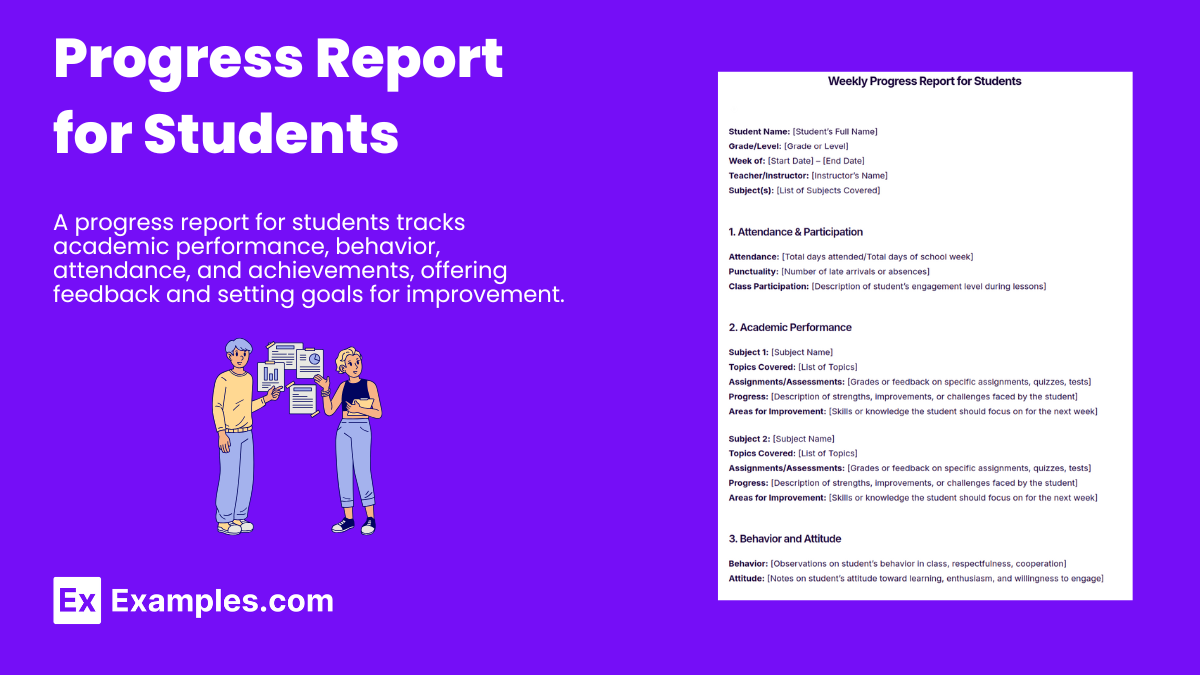
Picture this situation: Your kid excels in almost everything, what are you going to do to make sure that they excel in their academics and their social lives? How as a parent are you able to know what goes on in school if you have no idea? What do you do? It goes without saying that parents and teachers would always want their kids or their students to excel in everything they do. Sometimes too much of the pressure can be frustrating to students. But this should not be the case. For students, teachers and parents know that understanding and knowing the progress of their students or children is important. To be able to know what they are doing in school as well as knowing their weaknesses and strengths. For this to happen, teachers often give out report cards to the parents and to explain the reasons to the parents. If you know where I am going with this, you probably heard of progress reports. Progress reports are not only used for companies or businesses, they can also be used by teachers to track progress of their students. But how does it work? To know more, simply scroll down and enjoy learning more about it.
What is Progress Report for Students?
A Progress Report for Students is a document that provides a detailed overview of a student’s academic performance, behavior, and overall progress during a specific period. It includes grades, teacher feedback, and highlights areas of strength and improvement. These reports help students, parents, and teachers track progress and set goals for academic success. Typically issued quarterly or mid-term, they promote accountability and collaboration between home and school, ensuring students receive the necessary support.
Progress Report for Students Format
Opening Remarks
Good [morning/afternoon], dear parents, students, and faculty members. It is with great pride and gratitude that we present this progress report for our students.
Introduction
The purpose of this report is to provide a comprehensive review of the academic, behavioral, and extracurricular progress of our students during this term. It highlights their achievements, areas for improvement, and the collective efforts made to support their growth.
Acknowledgments
Student Effort:
We commend the dedication and hard work of all students in their academic and extracurricular pursuits. Their enthusiasm and commitment are truly inspiring.Teachers and Educators
Recognition:
A special thanks to our teachers and educators who have tirelessly guided and mentored the students, ensuring their learning journey is fruitful and engaging.Parents and Guardians
Appreciation:
We deeply appreciate the continuous support and involvement of parents and guardians, whose encouragement plays a crucial role in each student’s progress.School Administration
Gratitude:
We extend our heartfelt thanks to the school administration for providing the resources and support necessary to create a nurturing and effective learning environment.Support Staff
Acknowledgment:
The contributions of our support staff, from administrative personnel to facilities management, have been integral in ensuring the smooth functioning of all school activities.
Closing Remarks
Summarize:
This progress report is a testament to the combined efforts of students, teachers, parents, and staff. Together, we celebrate the achievements of our students while recognizing areas for future growth.Final Thanks:
We extend our sincere gratitude to everyone involved in making this term a success.Farewell:
Thank you for your attention, and we look forward to continuing our journey together toward greater accomplishments.
Progress Report for Students Example
Progress Report
Student Name: [Name]
Grade/Year: [Grade/Year]
School/Institution: [School Name]
Teacher: [Teacher’s Name]
Date: [Date]Academic Performance: [Name] has shown a steady improvement in their academic work this term. They have excelled in [specific subjects, e.g., Mathematics, Science], demonstrating [specific qualities, e.g., analytical thinking, creativity]. However, there is room for improvement in [specific subjects or skills, e.g., writing, time management]. Subject Strengths include [strengths observed, e.g., quick problem-solving, excellent comprehension], and areas for improvement are [areas to improve, e.g., focus on grammar in writing].
Behavioral and Social Skills: [Name] actively participates in class discussions and demonstrates good behavior. They are [specific trait, e.g., respectful, cooperative] with peers and teachers. However, they may need to work on [specific skill, e.g., expressing opinions more confidently, managing emotions during group tasks].
Extracurricular Activities: [Name] is actively involved in [specific activities, e.g., school choir, sports team], showing enthusiasm and commitment. Their participation has greatly contributed to their overall development.
Attendance: [Name] has attended [number] of [total] school days this term, maintaining a satisfactory/unsatisfactory attendance record.
Recommendations for Improvement: To continue their progress, [Name] is encouraged to focus on [specific area], practice [specific skill], and seek additional support in [specific subject/skill].
Teacher’s Remarks: Overall, [Name] is a diligent and motivated student. With consistent effort and focus, they are likely to achieve excellent results.
Teacher’s Signature: [Signature]
Short Progress Report for Students
Student Name: [Name]
Grade/Year: [Grade/Year]
Teacher: [Teacher’s Name]
Date: [Date]Academic Performance: [Name] has demonstrated consistent performance in [subject areas]. They excel in [specific subject/skill] but need improvement in [specific area].
Strengths: [Skill/Subject-specific strength], [Skill/Subject-specific strength]
Areas for Improvement: [Skill/Subject-specific area for improvement], [Skill/Subject-specific area for improvement]
Attendance: [Name] has attended [number] out of [total] days. Attendance is satisfactory/needs improvement.
Remarks: Overall, [Name] is progressing well. With consistent effort in [specific area], they can achieve greater success.
Teacher’s Signature: [Signature]
Daily Progress Report for Students

Weekly Progress Report for Students

Monthly Progress Report for Students

10+ Progress Report for Students Examples
1. Student Progress Report Template

2. Student Progress Report Card Template

3. Music Student Progress Report

4. Progress Report for Kindergarten Students
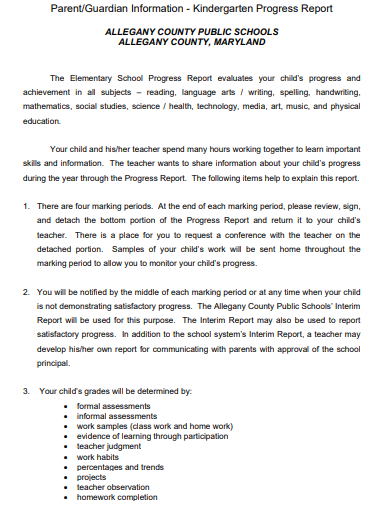
5. Sample Progress Report for Students

6. Progress Report for Elementary Students

7. Students Teaching Midterm Progress Report

8. Progress Report for College Students

9. Progress Report for Primary Students

10. Monthly Progress Report for Students

11. Weekly Progress Report for Students

How to Write a Progress Report for Students?
Title and Basic Information
Clearly mention the title, such as “Student Progress Report.”
Include basic information:Student Name
Class/Grade
Report Period
Date of IssueAcademic Performance
Provide details about the student’s performance in different subjects.
Highlight strengths and areas for improvement.
Use clear and concise language, supported by examples or grades.Behavioral and Social Development
Evaluate the student’s behavior in school, interaction with peers, and participation in group activities.
Highlight positive traits such as leadership, teamwork, or creativity.Attendance Record
Include a summary of the student’s attendance and punctuality.
Mention if absences or tardiness have impacted their progress.Extracurricular Activities
Discuss the student’s involvement in sports, arts, or other activities beyond academics.
Emphasize any significant achievements or contributions.Teacher’s Comments
Provide personalized feedback for the student.
Acknowledge their efforts and improvements.
Offer specific advice on how they can continue to grow.Goals and Recommendations
Set realistic and measurable goals for the student to achieve before the next report.
Suggest strategies or resources for improvement.Parent/Guardian Section
Include a space for parents to acknowledge receipt of the report and provide their feedback.
Importance of Progress Report for Students
Self-Awareness
Helps students understand their strengths and areas for improvement.
Encourages reflection on their academic performance.
Goal Setting
Enables students to set realistic and achievable goals.
Provides a roadmap for academic growth.
Motivation
Showcases incremental achievements, boosting confidence and commitment.
Encourages continued effort and persistence in studies.
Communication Tool
Facilitates clear communication between students, teachers, and parents.
Aligns all parties in supporting the student’s development.
Early Intervention
Identifies learning challenges or gaps early on.
Allows for timely, personalized strategies to address difficulties.
Accountability
Instills a sense of responsibility for one’s academic progress.
Prepares students for evaluative processes in higher education and careers.
Tracking Progress
Provides a structured method to monitor academic improvement over time.
Highlights trends in performance for better planning and adjustments.
Holistic Development
Encourages the development of life skills like time management and prioritization.
Promotes a balanced focus on academics and personal growth.
FAQs
How often are progress reports provided?
Progress reports are typically issued quarterly, mid-term, or at the discretion of the school or institution.
Can students improve their performance based on progress reports?
Yes, progress reports provide actionable feedback that helps students focus on areas needing improvement.
Who prepares the progress report?
Teachers or academic advisors usually prepare progress reports based on a student’s assignments, tests, and overall participation.
Are progress reports only for academic subjects?
No, progress reports may also cover extracurricular activities, behavior, and social development alongside academic subjects.
How can schools ensure progress reports are effective?
Schools can ensure effectiveness by providing clear, detailed, and constructive feedback, aligning reports with measurable goals, and engaging parents in follow-up discussions.

